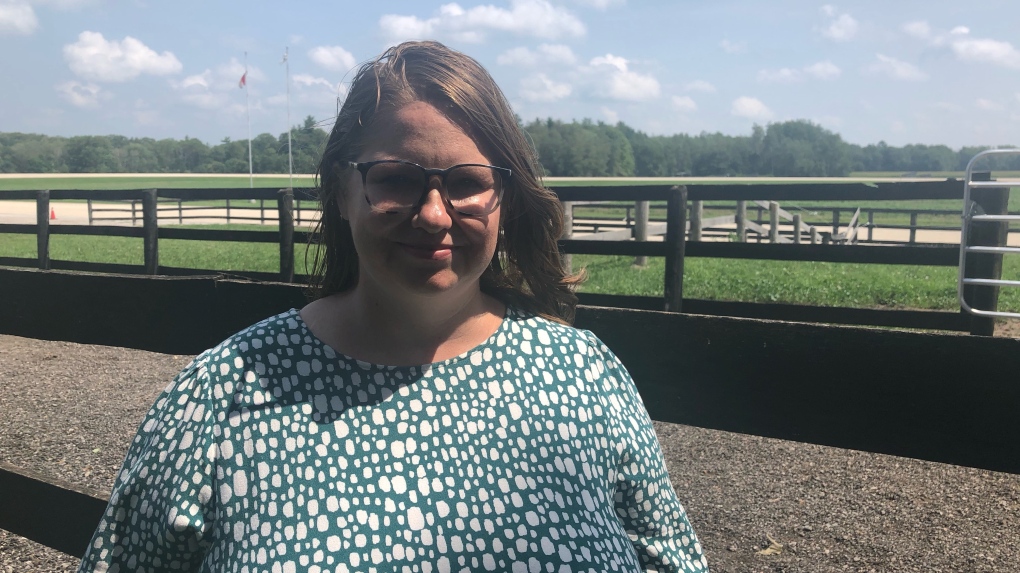'We have little land to produce a lot of food to feed a lot of people': OFA launches campaign to protect agriculture in SW Ontario
A campaign launched by the Ontario Federation of Agriculture (OFA) is encouraging communities to ‘Grow Up, Not Out.’
The OFA says Ontario is losing 175 acres of farmland a day to urban development -- that's roughly the size of 135 football fields.
The OFA campaign Homegrown is a program to protect and preserve farmland and sustainable food systems in Ontario.
"We have very little land to produce a lot of food to feed a lot of people," says Crispin Colvin, OFA executive director for the Lambton-Middlesex zone.
Colvin says less than five per cent of Ontario is arable land, much of it in Southwestern Ontario.
 Crispin Colvin, executive director of the Ontario Federation of Agriculture Lambton-Middlesex zone, speaks Monday, Aug. 9, 2021. (Jordyn Read / CTV News)
Crispin Colvin, executive director of the Ontario Federation of Agriculture Lambton-Middlesex zone, speaks Monday, Aug. 9, 2021. (Jordyn Read / CTV News)
Crispin Colvin speaks Monday, Aug. 9, 2021. (Jordyn Read / CTV News)
He says arable farmland is being lost to urban development at an alarming rate, in major and small urban areas.
"It’s because of way too much development, it is a lot of bad development to grow more houses. There's that short-sighted economic development little benefit, but it’s very short-sighted. If you can’t feed the people, if you can’t provide sustainable employment, then growing houses is not the answer.”
Thames Centre Deputy Mayor Kelly Elliott says due to the pandemic, many people from big urban areas were moving to smaller communities to seek more affordable prices or larger lots.
 Thames Centre Deputy Mayor Kelly Elliott speaks Monday, Aug. 9, 2021. (Jordyn Read / CTV News)
Thames Centre Deputy Mayor Kelly Elliott speaks Monday, Aug. 9, 2021. (Jordyn Read / CTV News)
Thames Centre Deputy Mayor Kelly Elliott speaks Monday, Aug. 9, 2021. (Jordyn Read / CTV News)
"In the past we have seen in our smaller communities the need for smaller homes, the single-family homes, the larger lots. People come out from big urban areas like the GTA to get out to small-town living, and they expect the room they don’t necessarily get at the city, but what we have sacrificed through that is our farmland."
To preserve land, Colvin is encouraging communities and municipalities to grow up, not out.
“People have to accept the fact that particularly in major urban areas such as London and Windsor, that they need to live in apartments or condominiums. Single-family homes take up a tremendous amount of land, they are wonderful but we are going to have to start looking at growing areas like North Bay, Timmins, Parry Sound, areas that are not arable,’ says Colvin.
"Farmers have done an incredible job in the last 20 years on producing more food on less land, and we have to do the same, produce more housing on less land," says Elliott.
Colvin says the time to preserve is yesterday -- with climate change causing devastation in western Ontario and droughts in the north.
He says his biggest fear is Canada becoming a food importing country, instead of a food exporting country.
Ontario grows more than 200 different commodities, more than any other province in the country.
Colvin says losing land at this rate, the province may not be able to sustain that.
"Southwestern Ontario is a very golden area, if we don’t work to preserve it, to use an analogy, we're killing the goose that laid the golden egg.”
CTVNews.ca Top Stories

Much of Canada is under a weather alert this weekend: here's what to know
From snow, to high winds, to extreme cold, much of Canada is under a severe weather alert this weekend. Here's what to expect in your region.
Mark Carney reaches out to dozens of Liberal MPs ahead of potential leadership campaign
Mark Carney, the former Bank of Canada and Bank of England governor, is actively considering running in a potential Liberal party leadership race should Justin Trudeau resign, sources tell CTV News.
'I gave them a call, they didn't pick up': Canadian furniture store appears to have gone out of business
Canadian furniture company Wazo Furniture, which has locations in Toronto and Montreal, appears to have gone out of business. CTV News Toronto has been hearing from customers who were shocked to find out after paying in advance for orders over the past few months.
Man injured in Longueuil home invasion in the presence of a child
A Longueuil resident was injured during a home invasion early Saturday morning in the presence of a child.
Jeff Baena, writer, director and husband of Aubrey Plaza, dead at 47
Jeff Baena, a writer and director whose credits include 'Life After Beth' and 'The Little Hours,' has died, according to the Los Angeles County Medical Examiner.
Hundreds of animals killed in Dallas shopping centre fire
A fire that broke out at a shopping center in Dallas on Friday morning killed more than 500 animals, most of which were small birds, authorities said.
MP Peter Fragiskatos calls on Trudeau to resign
Prime Minister Justin Trudeau has lost the confidence of another prominent Liberal MP.
Fugitive U.S. rioter seeks asylum in Whistler amid warnings of more to come
An American citizen convicted of participating in the Jan. 6, 2021, riot on Capitol Hill and dodging jail time in Whistler may just be the start of an asylum-seeking rush, according to a prominent legal expert.
Thirty years on, is Quebec headed for another independence referendum?
On the eve of the 30th anniversary of Quebec's second independence referendum -- the first one was in 1980 -- it seems the tide could be turning again. Legault is deeply unpopular after six years in power, and the Parti Quebecois, with a young, charismatic leader, has been ahead in the polls for more than a year.


































